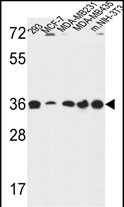
| WB | 1/1000 | Human,Mouse,Rat |
| IF | 咨询技术 | Human,Mouse,Rat |
| IHC | 咨询技术 | Human,Mouse,Rat |
| ICC | 技术咨询 | Human,Mouse,Rat |
| FCM | 咨询技术 | Human,Mouse,Rat |
| Elisa | 咨询技术 | Human,Mouse,Rat |
| Aliases | Torsin-1B, Torsin ATPase-1B, 364-, Torsin family 1 member B, TOR1B, DQ1 |
| Entrez GeneID | 27348 |
| WB Predicted band size | 38.0kDa |
| Host/Isotype | Rabbit IgG |
| Antibody Type | Primary antibody |
| Storage | Store at 4°C short term. Aliquot and store at -20°C long term. Avoid freeze/thaw cycles. |
| Species Reactivity | Human, Mouse |
| Immunogen | This TOR1B antibody is generated from rabbits immunized with a KLH conjugated synthetic peptide between 210-237 amino acids from the Central region of human TOR1B. |
| Formulation | Purified antibody in PBS with 0.05% sodium azide. |
+ +
以下是关于TOR1B抗体的3篇参考文献及其摘要概括:
---
1. **文献名称**: "The AAA+ Protein TorsinA Interacts with a Conserved Domain Important for Endoplasmic Reticulum Association in TorsinB"
**作者**: Goodchild, R.E., Dauer, W.T.
**摘要**: 该研究比较了TOR1A与TOR1B在内质网(ER)中的定位差异。通过使用特异性抗体进行免疫细胞化学分析,发现TOR1B的C端结构域对其ER定位起关键作用,而TOR1A的定位则依赖不同机制。
2. **文献名称**: "TorsinB Perinuclear Location and Association with HSP90 Are Dependent on ATP Binding"
**作者**: Jungwirth, M., et al.
**摘要**: 文章探讨了ATP酶活性对TOR1B亚细胞定位的影响。利用TOR1B抗体进行免疫荧光实验,发现ATP结合缺陷的TOR1B突变体无法定位于核周区域,且与分子伴侣HSP90的相互作用显著减少。
3. **文献名称**: "TorsinB Is Required for Neuronal Differentiation and Synaptic Development"
**作者**: Liang, C.C., et al.
**摘要**: 该研究通过TOR1B抗体进行Western blot和免疫组化,发现TOR1B在小鼠大脑发育过程中高表达。敲低TOR1B会导致神经元突触形成异常,提示其在神经发育中的关键作用。
---
这些文献展示了TOR1B抗体在解析蛋白定位、功能机制及疾病关联中的应用,涵盖基础机制到神经生物学研究。如需具体文章链接或更多文献,可进一步检索PubMed或相关数据库。
TOR1B antibodies target Torsin-1B, a member of the Torsin ATPase family, which are AAA+ (ATPases associated with diverse cellular activities) proteins localized primarily in the endoplasmic reticulum (ER) and nuclear envelope. Torsin-1B, encoded by the *TOR1B* gene, shares structural homology with Torsin-1A, a protein linked to early-onset dystonia (DYT1) when mutated. Unlike Torsin-1A, TOR1B is ubiquitously expressed and not directly associated with known genetic disorders, though its biological role remains under investigation.
Studies suggest Torsin-1B participates in maintaining nuclear envelope integrity, modulating ER stress responses, and facilitating membrane trafficking or cytoskeletal interactions. Its ATPase activity is thought to drive conformational changes critical for these processes. TOR1B antibodies are essential tools in research to visualize protein localization, quantify expression levels (via Western blot, immunofluorescence), and explore interactions with partners like lamins or cofactors (e.g., LAP1. LULL1). These antibodies also help dissect functional redundancies or distinctions between Torsin-1B and Torsin-1A, particularly in models of dystonia or ER-associated degradation. Commercial TOR1B antibodies vary in specificity; validation via knockout cell lines is recommended to avoid cross-reactivity. Current research focuses on clarifying Torsin-1B's role in cellular homeostasis and its potential implications in neurodegenerative or viral infection contexts, where Torsin proteins may influence pathogen replication.
×